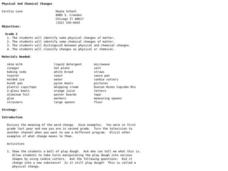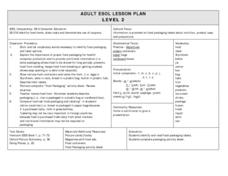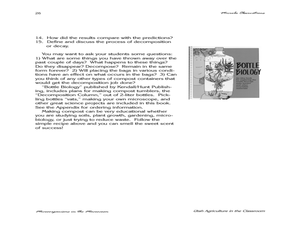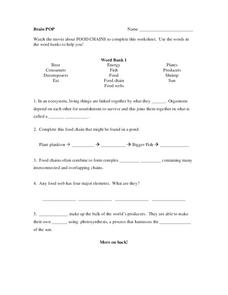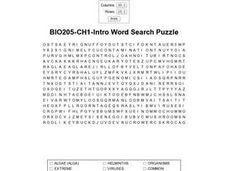Curated OER
Microorganisms: Good Guys or Bad Guys?
Learners discover the role microorganisms play in our lives. In this decomposition activity, students examine decaying foods and plants in order to analyze the different bacteria that grows. Learners discuss the good and bad of...
Curated OER
Yeast
Students study the characteristics of yeasts. In this biology lesson, students conduct experiments to measure yeast respiration. They discuss the favorable conditions needed for growing them.
Curated OER
Physical And Chemical Changes
Second graders identify physical and chemical changes of matter. They distinguish between physical and chemical changes. They classify changes as physical or chemical.
Curated OER
Thanksgiving Activity
Thanksgiving food doesn't have to be unhealthy! Learners read five situations about specific foods, ingredient substitutions, and ways to maintain healthy blood levels with a handy holiday worksheet.
Curated OER
Fungi
Students study fungi and its parts. For this exploring fungi lesson students fill out a worksheet that includes a diagram of fungi and questions.
Curated OER
Asexual Reproduction
In this asexual reproduction worksheet, students compare and contrast different types of asexual reproduction processes by examining prepared slides and completing 20 short answer questions, 4 drawings, and 9 fill in the blank questions.
Curated OER
Kitchen Chemistry
Fifth graders examine both physical and chemical changes, and how to identify the difference between the two. They observe the changes that occur in butter when it is exposed to heat and cold, heat energy. In their notebooks, they write...
Curated OER
ADULT ESOL LESSON PLAN--Level 2--Consumer Education
Pupils, after reviewing an extensive list of vocabulary terms on the board, identify/label food items, how much they cost and the value of using coupons to save money. In addition, they practice reading the labels on the food packaging...
Curated OER
Honeybee
Students investigate honeybees and the importance of honeybees to humans. They identify the various parts of a bee's body using velcro parts, role-play a hive, and answer review questions.
Curated OER
Spelling Connections: Grade 6: Dictionary Respellings
In this grade 6 spelling activity, students read 20 sentences with a spelling word written in bold type as a dictionary pronunciation. Students write the correct spelling word. There is no word list.
Curated OER
Hand Washing: I can handle it!
Students wash cinnamon off of their hands in a variety of ways to learn proper ways to disinfect. In this washing hands lesson plan, students use water, soap, cooking spray, and other ingredients to wash hands and talk about the results.
Curated OER
Rotten Truth
Students complete activities to study decomposition. In this decomposition lesson, students work in pairs to observe a decay buffet experiment. Students keep compost bag journals. Students define and discuss the process of decomposition.
Curated OER
Food Chains
In this chemistry worksheet, students watch a movie about food chains and use it to respond to each of the questions stated. They use the list of works in the word banks to assist them in matching the correct term to its description.
Curated OER
BIO205-CH1- Intro Word Search
In this word search instructional activity, learners locate words related to biology. The word list includes protists, viruses, plants, spiral, and biotechnology.
Curated OER
Fungus Among Us- Non-Fiction Reading Comprehension Worksheet
In this fungus non-fiction reading comprehension worksheet, students read a 3 page selection that describes the characteristics and life of fungi. They answer 10 questions based on the reading which include true or false, multiple...
Curated OER
Celebration Foods
In this celebration foods learning exercise, students circle yes, no, or maybe for if the foods we eat on holidays are healthy or unhealthy choices. Students complete 12 problems total.
Science Museum of Minnesota
Thinking Fountain: Making Mold
Thinking Fountain, from the Science Museum of Minnesota, offers a project in word and picture. With everyday items, you can grow your own mold, both bread mold and penicillin!
BiologyWise
Biology Wise: Bread Mold Facts
Explains what bread mold is, what causes it to grow on bread and other surfaces, types of bread molds, health risks, and some benefits.
BiologyWise
Biology Wise: What Causes Growth of Bread Mold and How to Prevent It?
Explains what bread mold is, what causes it to grow on bread, factors that contribute to its growth, and how to prevent its growth. Includes an experiment for growing mold on bread.
BiologyWise
Biology Wise: Black Bread Mold
Explains what black bread mold is, what it grows on, the conditions needed for growth, its method of reproduction, how to grow it, and how to prevent its growth.
Bill Nye
Bill Nye: Mold Madness
This tutorial from Bill Nye introduces the difference between mold and plants through a mold growing contest on pieces of bread.
BioEd Online
Bio Ed Online: Fungus Among Us
Fungi grow from spores and fungi spores are present almost everywhere. Molds and other fungi grow in damp places. In this lesson students will grow and observe bread mold and other kinds of common fungi. Student sheets are provided in...
Biology Pages
Kimball's Biology Pages: Antibacterial Agents
This site lists the different antibiotics, tells how they disrupt the life cycle of the bacteria, and give examples of where in nature the antibiotic is from- i.e., penicillin -> bread mold.
Cold Spring Harbor Laboratory
Dna From the Beginning: One Gene Makes One Protein
Early research showed that genes code for proteins. This was based on studies using mutant strains of bread mold. This multimedia article includes animations, pictures, video, biographical information, and quiz questions that are...
Other popular searches
- Bread Mold Experiment
- Moldy Bread Experiment
- Mold on Bread
- Free Bread Mold Experiment
- Bread Mold Labs
- Bread Mold Diagram
- Bread Mold Microscope
- Growing Bread Mold
- Bread Mold Fungi
- Growing Mold on Bread
- Microorganisms Bread Mold
- Population Growth Bread Mold


